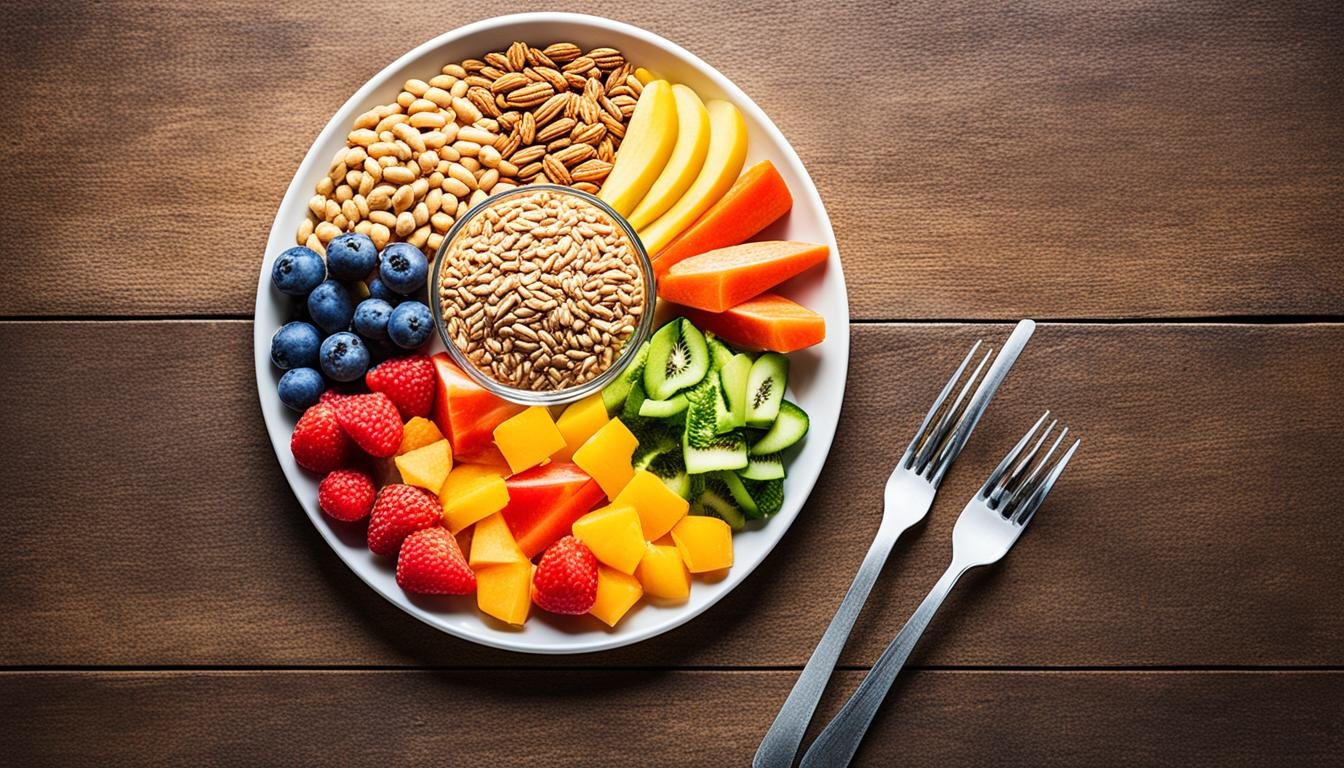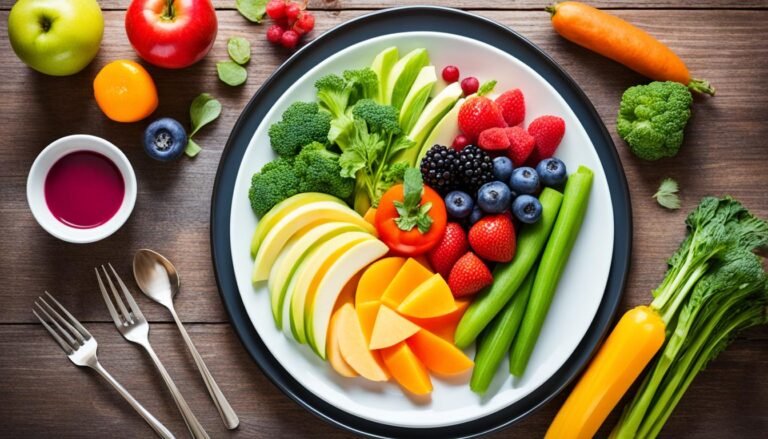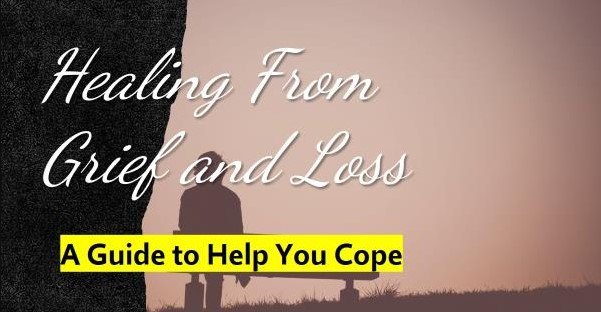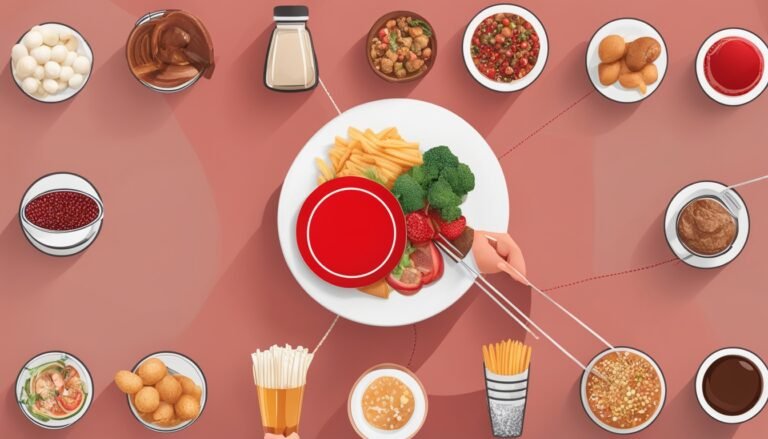What is considered healthy eating?
Think about all the times you struggled to eat well. It’s something we all face. We want things fast, but we know we need to feed our bodies right. The good news? A better, brighter life is closer than you think.
In Nigeria, the fight against sickness grows harder. This makes healthy eating more important than ever. Eating well means more than just looking a certain way or keeping up with the latest. It’s about keeping you healthy for the long run and staying away from sickness. Plus, it does wonders for your mood and energy too.
Where to start, though? This article will guide you through the ABCs of healthy eating. We’ll talk about why balance is key, cover the basic food groups, and share easy ways to eat better every day. Let’s start a journey to a healthier, happier you. You deserve to take charge of your health and feel the power of a balanced diet.
Key Takeaways
- Maintaining a healthy, balanced diet is essential for overall well-being and disease prevention.
- A healthy diet should include an appropriate balance of fruits, vegetables, whole grains, lean proteins, and healthy fats.
- Adopting healthy eating habits from an early age can foster healthy growth and development.
- Understanding the principles of dietary balance and the importance of different food groups is crucial for making informed choices.
- Practical tips like meal planning, portion control, and reading nutrition labels can help you implement a healthier lifestyle.
Understanding a Balanced Diet
A balanced diet is really important for our health. It means eating the right mix of fruits, vegetables, grains, proteins, and fats. In the UK, the Eatwell Guide advises one-third of our diet should be fruits and veggies. The guide also suggests we include starchy foods, dairy, and protein in our meals. Balancing our intake of macronutrients and micronutrients is key. This helps our bodies work well, fights off diseases, and keeps us lively.
Importance of Dietary Balance
Keeping a balanced diet helps us stay healthy and avoid illnesses. Getting the right mix of nutrients supports essential body functions, like making energy and fighting off bad stuff. It’s also great for keeping in shape. A balanced diet gives our bodies what they need, without too many calories.
Factors Influencing Dietary Patterns
Lots of things affect what we eat, like where we come from, what we like, and where we can get healthy food. Knowing these influences can lead to better choices. By understanding our needs and situation, we can eat in ways that are right for us.
Essentials of a Healthy Diet
To eat healthy, you need to mix it up. Include lots of different foods. Such as fruits, veggies, whole grains, lean meats, and good fats. These help your body get everything it needs to stay healthy.
Fruits and Vegetables
Eating fruits and veggies can keep you strong. They give you vitamins, minerals, and fiber. Aim to eat five servings every day. By choosing different colors, like greens, berries, and oranges, you get all the good stuff they offer.
Whole Grains and Starchy Foods
Whole grains are your friends. They include foods like brown rice, quinoa, and whole wheat bread. Not only do they have filling fiber, but they also provide energy and keep you healthy.
Lean Protein Sources
Proteins from lean sources help your muscles. Think about chicken, fish, eggs, or beans. They’re important for growth, repair, and to keep you moving.
Healthy Fats
Good fats are necessary for your body. Foods like avocados, nuts, and olive oil are great. They help your brain, keep your heart strong, and balance your eating plan.
Limiting Salt, Sugar, and Saturated Fats
Not all foods are good in large amounts. It’s wise to eat less salt, sugars, and bad fats. This way, you keep a good and sustainable diet.
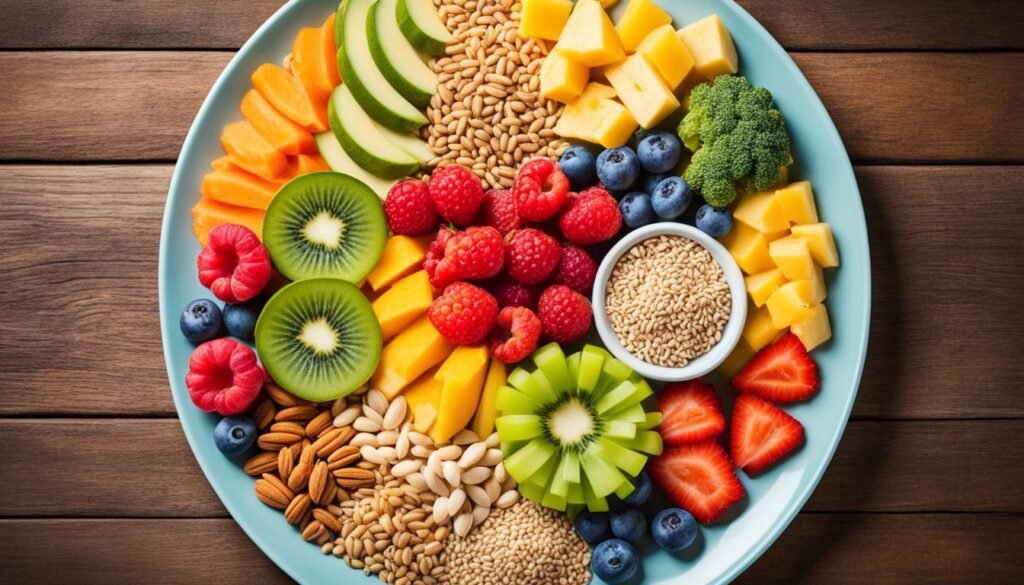
Follow these steps, and you will keep your body happy and healthy. This reduces the chances of getting sick for a long time.
What is considered healthy eating?
Healthy eating involves a well-rounded diet. It should include essential nutrients the body needs. The Dietary Guidelines for Adults offer tips for an adult’s nutritional well-being.
- Eating at least 5 portions of fruits and vegetables per day
- Basing meals on higher-fiber starchy foods, such as whole grains
- Including some dairy or dairy alternatives
- Consuming beans, pulses, fish, eggs, and lean meats for proteins
- Choosing unsaturated oils and spreads in small amounts
- Drinking plenty of fluids, at least 6-8 glasses per day
Proper infant nutrition and child nutrition are vital for healthy growth. Starting with breastfeeding and introducing nutrient-packed foods supports good habits early. This can lower the chances of health problems as they grow up.
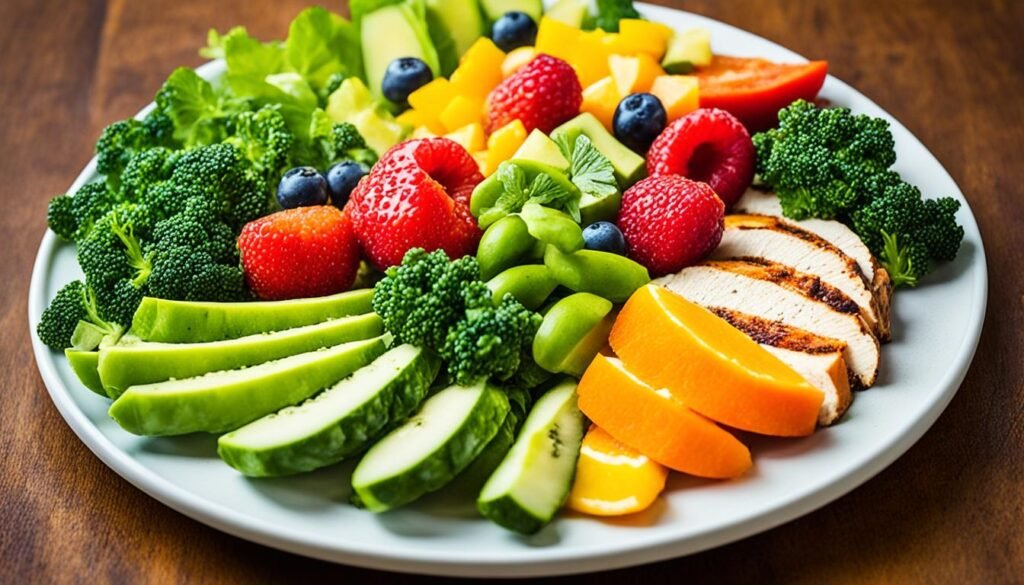
Practical Tips for Healthy Eating
Want to eat healthier every day? Start by planning and preparing your meals. A weekly meal plan and a grocery list are great. Remember, it’s important to prepare your meals and snacks ahead of time. And don’t forget about portion control. It’s key to keeping your calories in check.
Looking at nutrition labels helps you choose wisely when buying food. They show you how much sodium, sugars, and fats are in your food. By learning to use these labels, you can change the way you eat for the better.
Meal Planning and Preparation
Planning what you’ll eat is a smart way to stay on track with your diet. Create a meal plan for the week that fits your life. This makes shopping easier and ensures you’ll have everything you need. Try to prep your meals on the weekend. Chop veggies, cook grains, or portion out proteins. It saves time and makes eating well simpler during the week.
Portion Control
Watching your portions is vital for staying healthy. It’s easy to eat too much, especially with big meals or snacks. Learn what a healthy portion looks like and use smaller dishes. This simple change can help you eat the right amount. Eating slowly and enjoying your food can also help you avoid overeating.
Reading Nutrition Labels
Getting good at reading labels can boost your healthy eating habits. Next time you shop, take a good look at the nutrition labels. They tell you important things like calories, sugars, and fats. Understanding these labels helps you pick better foods. It supports your meal planning and portion control efforts.
Benefits of a Healthy Diet
Eating well is key to feeling good and staying healthy. A diet full of nutrients can ward off illnesses. It lowers the risk of heart issues, diabetes, and some cancers. Such a diet also boosts your immune system and fights inflammation.
Disease Prevention
Adding lots of fruits, veggies, grains, lean meat, and good fats to your meals works wonders. It cuts down your chances of getting sick. These foods improve your blood pressure, lower bad cholesterol, and can prevent diabetes and cancer.
Weight Management
Diet and exercise go hand in hand for weight control. Eat low-calorie, high-nutrient foods and watch how much you eat. This keeps your weight in check. It also helps avoid health problems tied to being overweight.
Improved Energy and Vitality
If you fuel up right, you’ll have energy all day. A diet with complex carbs, protein, and good fats does the trick. It makes you alert, active, and efficient. You can tackle tasks, physical or mental, like a pro.
Overcoming Barriers to Healthy Eating
Many know that eating healthy is good, but several things stop us. We fight these barriers by correcting misunderstandings, making the right choices easier, and fitting eating habits to our lives and likes.
Addressing Misconceptions
People often think good foods are too costly or not tasty. But, there are many budget-friendly and yummy options like fresh fruits, whole-wheat bread, and beans. Informing everyone about these choices shows them healthy eating can be enjoyable.
Making Healthy Choices Convenient
The fast-paced life and scarce access to good foods are tough obstacles. We can beat them by ensuring nutritious meals are easy to get and simple to add to our days. Tips include preparing meals ahead, having healthy snacks ready, and asking for more good food to be sold nearby.
Adapting to Cultural and Personal Preferences
Our choices in food reflect our culture and what we personally enjoy. Respecting and supporting these preferences can steer us towards a healthier path. For some, it might mean finding nutritious options within traditional cuisines. For others, trying new foods that suit their likes is the way to go.
Conclusion
Eating a healthy, balanced diet is key to feeling good and avoiding sickness. Include lots of nutrient-dense foods in your meals. Think fruits, veggies, whole grains, lean meats, and healthy fats. Stay away from too much salt, sugar, and bad fats. This way, your body gets all it needs to be well.
A balanced diet isn’t just about avoiding being sick. It helps you keep a good weight and gives you energy. Learn what good eating is about and use helpful tips. This lets you make changes that help you as a whole. And it makes Nigeria healthier too.
Remember, good eating doesn’t look the same for everyone. You should think about what you like, what’s around, and what you need. Finding your own balance matters a lot. It takes work and trying new things, but you’ll feel a lot better and full of life.
